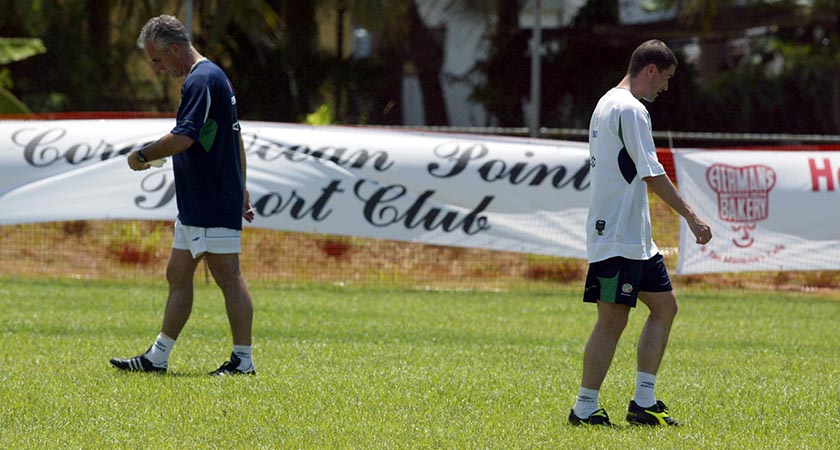IT WOULD be impossible to invent a man like Roy Keane, a bluntly honest high-achiever whose caustic smile and stony eyes tell only part of the story of his personality.
One minute, he can be incredibly generous with his time and money to both friends and strangers, and the next he can be withering in his putdowns to colleagues.
His recent assessment of Aiden McGeady was not so much sharp as cutting. “He could have done a lot better [in the 2-1 defeat to Belarus] but then that has been the story of his career.”
The story of Keane’s career has revolved around his tongue as much as any other part of his body.
The man who carried Ireland on his shoulders to the 2002 World Cup finals then managed to talk his way out of the tournament.
 World Cup 2002 Republic of Ireland 21/5/2002. Manager Mick McCarthy and Roy Keane pass each other during training [©INPHO/Andrew Paton]
World Cup 2002 Republic of Ireland 21/5/2002. Manager Mick McCarthy and Roy Keane pass each other during training [©INPHO/Andrew Paton]Yet here he is, five years on, at it again. “We could have killed some of the players,” Keane said in response to their insipid performance against Belarus, their last outing before Sweden in the first group game. Then, half an hour later, he was asked another question.
“Can Ireland win the Euros?”
And for once he struggled for words.
"Can we win it? We can if we win a few games. What do you want me to say there? It'll be very difficult. What price are we? Anyone know?
"I know people will mention Leicester. And that was a great story. They play with a lot of enthusiasm and energy. That's a good starting point and we probably didn't do enough of that against Belarus. In football you need pace – Leicester had that.
"To answer your question, we can win it but it's easier said than done when I am standing here in a hotel lobby with a bottle of water in my hand.”
Still there is hope. “With the manager we have, we certainly believe we can get out of the group and then you take it from there. Even as a player you never really think beyond that because of the pitfalls. Personally – I definitely think we can get out of the group.”
The source of his conviction stems from his faith in O’Neill rather than his faith in the Ireland players.
![Republic of Ireland continue to slide down the rankings under Martin O'Neill and Roy Keane [Picture: Inpho]](https://media.irishpost.co.uk/uploads/2015/08/oneill-keane-n.jpg) Keane has the utmost respect for O'Neill [Picture: Inpho]
Keane has the utmost respect for O'Neill [Picture: Inpho]“Martin’s experienced, he has a good way with the players,” Keane said. “He knows his football. A lot of managers I've worked with know what to say at the right time and Martin always gets it spot on with whatever he says to the players, the staff. He's a loyal guy.
“The nature with sport is that you always feel you have unfinished business. I sort of feel that way after my disappointment with how it finished up with Ipswich. You always feel you should go out to prove people wrong.
"It gives you a bit of energy to kick on. It's slightly different with the manager, because his track record is pretty decent and mine is sketchy, but you always use it as some form of motivation. I don't think Martin is sticking it to anybody at Sunderland. He's a good manager and everyone knows it – they should have just left him alone there.”
And that was one of the selling points the FAI pitched to O’Neill when they recruited him back in the autumn of 2013. “We don’t interfere,” they said to him at the time. “We leave you to it.” Hence why Keane – their most vocal critic – was allowed become part of the managerial ticket.
Along the way, their quirks and old-school methods have raised a few eyebrows, particularly in this modern world where players are fed a diet of stats and philosophies.
“Yeah, that kind of stuff seems to be coming into the game more and more, especially in England with the amount of foreign owners who are there,” Keane said.
“Particularly the Americans. They seem to love a coach who’s got the whistle around his neck, a clipboard and a tan and really white teeth. That gives you a chance of getting a job.
“Martin is old-school, he likes to manage away from the team, the staff, the preparation, what we’re doing. It’s slightly different at club level, they want someone who can put loads of cones and mannequins out.”
![Martin O'Neill [Picture: Inpho]](https://media.irishpost.co.uk/uploads/2015/10/Martin-ONeill-Germany-N.jpg) Martin O'Neill is 'old-school', says Keane [Picture: Inpho]
Martin O'Neill is 'old-school', says Keane [Picture: Inpho]Yet here, a year after the low point of his tenure, he has another significant issue to deal with, namely the question of whether Ireland’s abysmal showing at Euro 2012 has left permanent scars in the minds of the players who travelled to Poland.
“Certainly there has been a few things said over the last few years about the mentality at the last Euros,” Keane said.
“That was a tough group for Ireland. I don’t think for one minute the last squad were thinking they were going over there for a sing-song. No. They went over there and had a bad start and it’s very hard to recover from that.
"I don’t want to come across as critical of the previous squad and I don’t sense that [fear] in the group this time. In 2012, they went over thinking they could get out of the group and we have the same mindset. To qualify.”
So, for now, they’re singing off the same page.

